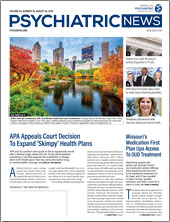The legislative year began slowly thanks to a 35-day, partial shutdown of the federal government last winter. But it’s the busy season now, with much sound and fury emanating from both ends of Pennsylvania Avenue. What progress can we expect from this summer of activity? Only time will tell.
After holding dozens of hearings, congressional health care committees are beginning to move legislation on several issues, including the cost of prescription drugs, “surprise” medical bills, and mental health parity. In the meantime, the House of Representatives passed 10 of its 12 required annual appropriations bills, with the last two unlikely to move on their own. The Senate, however, has considered none. But that is about to change, with a new demonstration that bipartisan-dealmaking is still possible when both parties see it is in their political interests—a hopeful sign for mental health.
It looks increasingly likely that the Senate will consider health care legislation this fall. The Committee on Health, Education, Labor, and Pensions, led by Committee Chair Lamar Alexander (R-Tenn.) and Ranking Member Patty Murray (D-Wash.), recently passed bipartisan legislation by a 20-3 vote. That bill, called the Lowering Health Care Costs Act (S 1895), includes APA’s signature initiative sponsored by Sens. Christopher Murphy (D-Conn.) and Bill Cassidy (R-La.), the Mental Health Parity Compliance Act (S 1737).
Too many psychiatrists, other practitioners, and patients have felt the impact of insurance companies’ persistent failures to comply with the Mental Health Parity and Addiction Equity Act of 2008, commonly called the parity law (see article above). The bipartisan Murphy-Cassidy bill would boost compliance by ensuring that insurance companies actually do the analyses mandated by the 2008 law to determine if they’re in compliance and by making these analyses available to regulators. In short, it requires them to show their work.
The fate of the Murphy-Cassidy bill and the House companion measure (HR 3165), being championed by Reps. Katie Porter (D-Calif.), Gus Bilirakis (R-Fla.), Donald Norcross (D-N.J.), and Markwayne Mullin (R-Okla.), will be influenced by the broader debate around prescription drug prices and surprise medical bills, since there appears to be bipartisan interest in addressing those issues, at least to some degree.
But the elephant in the room—or donkey, depending on one’s political persuasion—is whether measures like the Lowering Health Care Costs Act will be derailed over disagreement about how to lower prescription drug costs, protect patients from “surprise” medical bills, and address other policy and political priorities.
Fortunately, Washington has likely averted a sequel to last winter’s government shutdown. Until late July, it looked like Washington was headed for another implosion over federal spending and budget cuts. Spring began on an optimistic note with the House passing a Labor-Health and Human Services-Education spending bill for FY 2020 (see
here). The bill funds an array of priorities for psychiatry, including funds to enhance community crisis care for those with severe mental illness, boosts for student loan repayment programs, an increase for the Minority Fellowship Program, and new funding for public health research into firearm-related injury and mortality prevention. And, of course, it also included budget increases for the Substance Abuse and Mental Health Services Administration, the National Institutes of Health, and other important health agencies.
The prospects for bringing some of these potential gains over the finish line have been related to how Congress and the White House would navigate two key fiscal issues—the need to raise the federal limit on how much debt the U.S. Treasury may incur and the law that would automatically cut annual spending for defense and nondefense by $125 billion (about 10%) in January 2020 if there is no spending deal. Happily, in a rare moment of comity, the White House and both houses of Congress reached a two-year agreement that addressed both issues. The result? It is now reasonable to expect appropriations bills to pass this year and next without a government shutdown, with the potential to steer needed funding to mental health– and substance use–related public health programs.
Of course, in a volatile political environment, the situation can change very quickly. But now that President Trump has signed a two-year budget deal negotiated by Congress and the administration, automatic spending cuts to federal programs are avoided and spending limits are set. However, Congress still has to pass individual bills to fund federal agencies before September 30, the end of the federal fiscal year. That matters far more than the federal budget.
The larger fiscal debates and politics in D.C. matter immensely for mental health priorities large and small. And with the parameters of the fiscal debate now clarified, for the moment, we have the opportunity to redouble our advocacy efforts, better fund some mental health and substance use programs, and make other good things happen. So please thank your members of Congress, urge them to fund mental health– and substance use–related efforts, and encourage them to pass measures like the bipartisan Mental Health Parity Compliance Act. If you need advice on how to do that, email us at
[email protected].
The spring of 2019 kicked off a summer of opportunity. Let’s hope it signifies genuine progress by the time winter arrives. ■
To become involved in APA’s advocacy efforts and learn more about the initiatives on which APA is working, visit
here.

